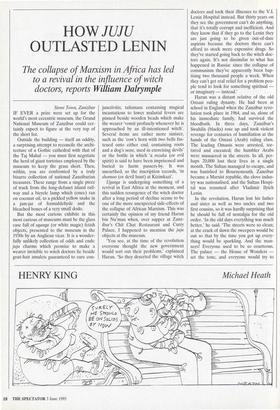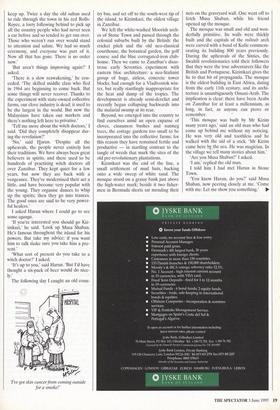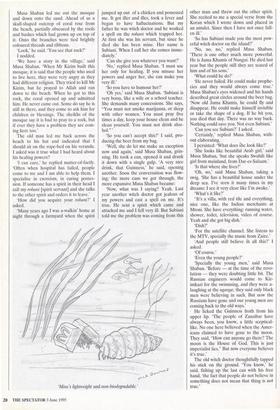HOW JUJU
OUTLASTED LENIN
The collapse of Marxism in Africa has led to a revival in the influence of witch
doctors, reports William Dalrymple Stone Town, Zanzibar IF EVER a prize were set up for the world's most eccentric museum, the Grand National Museum of Zanzibar could cer- tainly expect to figure at the very top of the short list.
Outside the building — itself an oddity, a surprising attempt to reconcile the archi- tecture of a Gothic cathedral with that of the Taj Mahal — you must first negotiate the herd of giant tortoises employed by the museum to keep the grass short. Then, within, you are confronted by a truly bizarre collection of national Zanzibarian treasures. These range from a single piece of track from the long-defunct island rail- way and a bicycle lamp which (once) ran on coconut oil, to a pickled yellow snake in a jam-jar of formaldehyde and the bleached bones of a very small dodo.
But the most curious exhibits in this most curious of museums must be the glass case full of uganga (or white magic) fetish objects, presented to the museum in the 1930s by an Anglican vicar. It is a wonder- fully unlikely collection of odds and ends: juju charms which promise to make a wearer invisible to witch doctors lie beside goat-hair amulets guaranteed to cure con- junctivitis; talismans containing magical incantations to lower malarial fevers are pinned beside wooden beads which make the wearer 'vomit profusely whenever he is approached by an ill-intentioned witch'. Several items are rather more sinister, such as the `cow's horn with two bells fas- tened onto either end, containing roots and a dog's nose, used in exorcising devils' or the bottle in which 'a mzuka (or evil spirit) is said to have been imprisoned and buried to harm passers-by. It was unearthed, so the inscription records, 'in shomoo (or devil hunt) at Kizimkazi'.
Uganga is undergoing something of a revival in East Africa at the moment, and this sudden resurgence of the witch doctor after a long period of decline seems to be one of the more unexpected side-effects of the collapse of African Marxism. This was certainly the opinion of my friend Harun bin Nu'man when, over supper at Zanz- ibar's Chit Chat Restaurant and Curry Palace, I happened to mention the juju objects at the museum.
`You see, at the time of the revolution everyone thought the new government would sort out their problems,' explained Harun. 'So they deserted the village witch doctors and took their illnesses to the V.I. Lenin Hospital instead. But thirty years on they see the government can't do anything, that it's totally corrupt and inefficient. And they know that if they go to the Lenin they are just going to be given out-of-date aspirins because the doctors there can't afford to stock more expensive drugs. So they've started going back to the witch doc- tors again. It's not dissimilar to what has happened in Russia: since the collapse of communism they've apparently been bap- tising two thousand people a week. When they can't get real relief for a problem peo- ple tend to look for something spiritual or imaginary — instead.'
Harun was a distant relative of the old Omani ruling dynasty. He had been at school in England when the Zanzibar revo- lution took place in 1964, and so, alone of his immediate family, had survived the bloodbath. In three days, Zanzibar's Swahilis (blacks) rose up and took violent revenge for centuries of humiliation at the hands of the Omani (Arab) ruling class. The leading Omanis were arrested, tor- tured and executed; the humbler Arabs were massacred in the streets. In all, per- haps 20,000 lost their lives in a single month. The Sultan managed to escape, and was banished to Bournemouth. Zanzibar became a Marxist republic, the clove indus- try was nationalised, and the Sultan Hospi- tal was renamed after Vladimir Ilyich Lenin.
In the revolution, Harun lost his father and sister as well as two uncles and two first cousins, so it was hardly surprising that he should be full of nostalgia for the old order. 'In the old days everything was much better,' he said. The streets were so clean; at the crack of dawn the sweepers would be out so that by the time you got up every- thing would be sparkling. And the man- ners! Everyone used to be so courteous. The palace — the House of Wonders set the tone, and everyone would try to keep up. Twice a day the old sultan used to ride through the town in his red Rolls- Royce, a lorry following behind to pick up all the country people who had never seen a car before and so tended to get run over. Those who weren't run over would stand to attention and salute. We had so much ceremony, and everyone was part of it. Now all that has gone. There is no order now.'
`But aren't things improving again?' I asked.
`There is a slow reawakening,' he con- ceded. 'The skilled middle class who fled in 1964 are beginning to come back. But some things will never recover. Thanks to the experiment with state-owned collective farms, our clove industry is dead; it used to be the largest in the world. But now the Malaysians have taken our markets and there's nothing left here to privatise.'
`Tell me more about the witch doctors,' I said. 'Did they completely disappear dur- ing the revolution?'
'No,' said Ijarun. 'Despite all the upheavals, the people never entirely lost their traditions. We have always been great believers in spirits, and there used to be hundreds of practising witch doctors all over Zanzibar. They kept quiet for a few years, but now they are back with a vengeance. They've modernised their act a little, and have become very popular with the young. They organise dances to whip up the spirits; then they go into trances. The good ones are said to be very power- ful healers.'
I asked Harun where I could go to see some uganga.
`If you're interested you should go Kiz- imkazi,' he said. 'Look up Musa Shaban. He's famous throughout the island for his powers. But take my advice: if you want him to talk make sure you take him a pre- sent.'
`What sort of present do you take to a witch doctor?' I asked.
`It's up to you,' said Harun. 'But I'd have thought a six-pack of beer would do nice- ly.'
The following day I caught an old coun- `I've got skin cancer from coming outside fora smoke!'
try bus, and set off to the south-west tip of the island, to Kizimkazi, the oldest village in Zanzibar.
We left the white-washed Moorish arch- es of Stone Town and passed through the colonial suburbs built by the British: the cricket pitch and the old neo-classical courthouse, the botanical garden, the golf course and the blue corrugated-iron club- house. Then we came to Zanzibar's disas- trous early Seventies experiment with eastern bloc architecture: a neo-Stalinist group of huge, airless, concrete tower blocks, bad enough for a Vladivostok win- ter, but really startlingly inappropriate for the heat and damp of the tropics. The development is already semi-derelict and recently began collapsing backwards into the malarial swamp at its rear.
Beyond, we emerged into the country to find ourselves amid an open expanse of cloves, cinnamon bushes and nutmeg trees, the cottage gardens too small to be incorporated into the collective farms; for this reason they have remained fertile and productive — in startling contrast to the tangle of weeds that mark the sites of the old pre-revolutionary plantations.
Kizimkazi was the end of the line, a small settlement of mud huts, backing onto a wide sweep of white sand. The mosque stood on a grassy bank just above the high-water mark; beside it two fisher- men in Bermuda shorts sat mending their nets on the graveyard wall. One went off to fetch Musa Shaban, while his friend opened up the mosque.
The mosque was small and old and won- derfully primitive. Its walls were thickly built and the capitals of the mihrab arch were carved with a band of Kufic commem- orating its building 800 years previously. During the upheavals of the Sixties, the Swahili revolutionaries told their followers that they were the true adventurers like the British and Portuguese. Kizimkazi gives the lie to that bit of propaganda. The mosque is the oldest building in East Africa, dating from the early 11th century, and its archi- tecture is unambiguously Omani-Arab. The implication is clear: there have been Arabs on Zanzibar for at least a millennium, as long, in fact, as anyone can prove or remember.
`This mosque was built by Mr Kizim many years ago,' said an old man who had come up behind me without my noticing. He was very old and toothless and he walked with the aid of a stick. 'Mr Kizim came here the sea. He was magician. In the village we tell many stories about him.'
`Are you Musa Shaban?' I asked.
`I am,' replied the old man.
I told him I had met Harun in Stone Town.
`You know Harun, do you?' said Musa Shaban, now peering closely at me. 'Come with me. Let me show you something.' ■ Musa Shaban led me out the mosque and down onto the sand. Ahead of us a skull-shaped outcrop of coral rose from the beach, partially obscured by the roofs and bushes which had grown up on top of it. Onto the branches were tied brightly coloured threads and ribbons.
`Look,' he said. 'You see that rock?'
I nodded.
`We have a story in the village,' said Musa Shaban. 'When Mr Kizim built this mosque, it is said that the people who used to live here, they were very angry as they had different religion. They tried to kill Mr Kizim, but he prayed to Allah and ran down to the beach. When he got to this rock, the coral opened up and admitted him. He never came out. Some do say he is still in there, and they come to ask him for children or blessings. The sheikhs of the mosque say it is bad to pray to a rock, but if ever they have a problem they are com- ing here too.'
The old man led me back across the beach to his but and indicated that I should sit on the rope-bed on his veranda. I asked was it true what I had heard about his healing powers?
'I can cure,' he replied matter-of-factly. `Often when hospital has failed, people come to me and I am able to help them. I specialise in exorcism, in curing posses- sion. If someone has a spirit in their head I call my rohani [spirit servant] and she talks to the other spirit and orders it to leave.'
`How did you acquire your rohani?' I asked.
`Many years ago I was a-walkin' home at night through a farmyard when the spirit jumped up out of a chicken and possessed me. It got iller and iller, took a fever and began to have hallucinations. But my father he was witch doctor and he worked a spell on the rohani which trapped her. At first she was his servant, but since he died she has been mine. Her name is Subiani. When I call her she comes imme- diately.'
`Can she give you whatever you want?'
`No,' replied Musa Shaban. 'I must use her only for healing. If you misuse her powers and anger her, she can make you very ill.'
`So you have to humour her?'
`Oh yes,' said Musa Shaban. Subiani is very bossy, like a wife or a school teacher. She demands many concessions. She says, "You must not smoke marijuana, or sleep with other women. You must pray five times a day, keep your house clean and be clean yourself. You must not drink alco- hol." ' `So you can't accept this?' I said, pro- ducing the beer from my bag.
`Well, she do let me make an exception now and again,' said Musa Shaban, grin- ning. He took a can, opened it and drank it down with a single gulp. 'A very nice drink, that Guinness,' he said, opening another. Soon the conversation was flow- ing; the more cans we got through, the more expansive Musa Shaban became: `Now, what was I saying? Yeah. Last year another witch doctor got jealous of my powers and cast a spell on me. It's true. He sent a spirit which came and attacked me and I fell very ill. But Subiani told me the problem was coming from this `Mine's lightweight and non-biodegradable.' other man and threw out the other spirit. She recited to me a special verse from the Koran which I wrote down and placed in an amulet. Since then I have not once fall- en ill.'
`So has Subiani made you the most pow- erful witch doctor on the island?'
`No, no, no,' replied Musa Shaban. `There is one other much more powerful. He is Juma Khamis of Nungui. He died last year but the people still they are scared of him and of his sons.'
`What could he do?'
`He never failed. He could make prophe- cies and they would always come true.' Musa Shaban's eyes widened and his hands described great circles around the beer bag. `Now old Juma Khamis, he could fly and disappear. He could make himself invisible or take the shape of a dog. If he bit you, you died that day. There was no way back. Nothing could save you. Not even Subiani.'
`Can you see Subiani?' I asked.
`Certainly,' replied Musa Shaban, with- out elaborating. I persisted: 'What does she look like?' She looks like beautiful Arab girl,' said Musa Shaban, 'but she speaks Swahili like girl from mainland, from Dar-es-Salaam.' `Is that where she lives?'
'Oh, no,' said Musa Shaban, taking a swig. She has a beautiful house under the deep sea. I've seen it many times in my dreams: I see it very clear like I'm awake.'
`What's it like?'
"It's a villa, with red tile and everything, nice one, like the Indian merchants at Mtoni. She have everything: running water, shower, toilet, television, video of course. Yeah and she got big dish.'
`Dish?'
`For the satellite channel. She listens to the MTV, specially the music from Zaire.'
`And people still believe ih all this?' I asked.
'Of course.'
`Even the young people?'
`Specially the young men,' said Musa Shaban. 'Before — at the time of the revo- lution — they were doubting little bit. The Russian engineers would come to Kiz- imkazi for the swimming, and they were a- laughing at the uganga; they said only black men were believing in such. But now the Russians have gone and our young men are coming back to the old ways.'
He licked the Guinness froth from his upper lip. The people of Zanzibar have always been, you know, a little sceptical- like. No one here believed when the Amer- icans claimed to have gone to the moon. They said, "How can anyone go there? The moon is the House of God. This is just imperialist lies." But now everyone believes it's true.'
The old witch doctor thoughtfully tapped his stick on the ground. 'You know,' he said, fishing up the last can with his free hand, 'the fact that people do not believe in something does not mean that thing is not true.'




































































 Previous page
Previous page